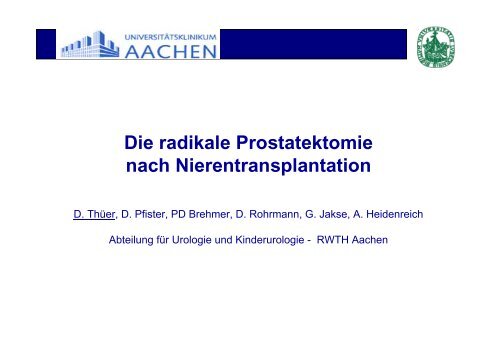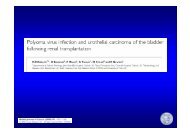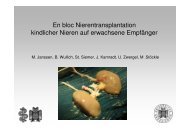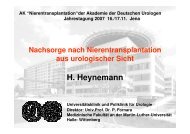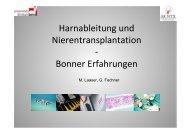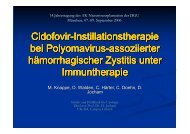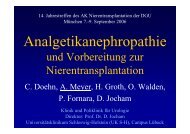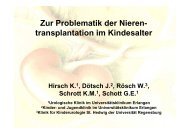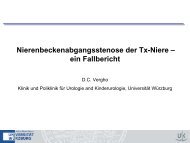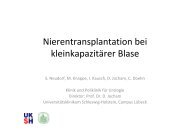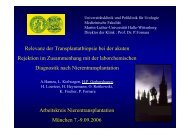Prostatakrebs und Nierentransplantation - nieren-transplantation.com
Prostatakrebs und Nierentransplantation - nieren-transplantation.com
Prostatakrebs und Nierentransplantation - nieren-transplantation.com
Erfolgreiche ePaper selbst erstellen
Machen Sie aus Ihren PDF Publikationen ein blätterbares Flipbook mit unserer einzigartigen Google optimierten e-Paper Software.
Die radikale Prostatektomie<br />
nach <strong>Nieren<strong>transplantation</strong></strong><br />
D. Thüer, D. Pfister, PD Brehmer, D. Rohrmann, G. Jakse, A. Heidenreich<br />
Abteilung für Urologie <strong>und</strong> Kinderurologie - RWTH Aachen
Hansa Teutonica<br />
ist die Bezeichnung für die zwischen Mitte des 12. Jahrh<strong>und</strong>erts <strong>und</strong> Mitte des 17.<br />
Jahrh<strong>und</strong>erts bestehenden Vereinigungen niederdeutscher Kaufleute, deren Ziel die<br />
Sicherheit der Überfahrt <strong>und</strong> die Vertretung gemeinsamer wirtschaftlicher Interessen<br />
besonders im Ausland war
<strong>Prostatakrebs</strong> <strong>und</strong> <strong>Nieren<strong>transplantation</strong></strong><br />
• 1350: 42 de novo Malignitäten in 39 Patienten (3.1%)<br />
• 21 <strong>Prostatakrebs</strong> (1.5%) (2,5%² - 4%³)<br />
• Alter 60 +/- 8.3 Jahren<br />
• höheres urologisches Malignitätgsrisiko<br />
• <strong>Prostatakrebs</strong> <strong>und</strong> Nierenzellkarzinom können gleich behandelt werden als<br />
Normalpopulation mit hoffnungsvolle onkologische Ergebnisse <strong>und</strong> niedriger<br />
Morbidität<br />
Screening Program!<br />
Elkentaoui et Al. Urology. 2009 Oct 26<br />
Therapeutic Management of De Novo Urological Malignancy in Renal Transplant Recipients: The<br />
Experience of the French Department of Urology and Kidney Transplantation from Bordeaux.<br />
²Morton JJ et al., Brit J Urol 75: 498, 1995<br />
³Ha R et al., South Med J 91: 847, 1998
<strong>Prostatakrebs</strong> <strong>und</strong> <strong>Nieren<strong>transplantation</strong></strong><br />
1. Radikale Prostatektomie<br />
2. Perkutane Radiatio<br />
3. Brachytherapie
<strong>Prostatakrebs</strong> <strong>und</strong> <strong>Nieren<strong>transplantation</strong></strong><br />
1. Radikale Prostatektomie<br />
2. Perkutane Radiatio<br />
3. Brachytherapie
Materialen <strong>und</strong> Methoden<br />
• Retrospektive Studie (1999-2008), 2 Operateure<br />
• 22 Radikale Prostatektomien: 15 retropubische + EPLA, 7 perineale<br />
• Alter 64 Jahren (59 - 69), PSA 4,5 ng/ml versus 9,2ng/ml<br />
•Gleason - Score, cT-Stadium nicht unterschiedlich<br />
•Kreatinin präop 1,3mg/dl (0,9-2.0), Harnstoff präop 45mg/dl<br />
•Interval NTX-Pca: 145 (104-206 Monate)<br />
•Immuntherapie: Azathioprin / Cyclosporin
Materialen <strong>und</strong> Methoden<br />
+ELAD<br />
Zeit (min.)<br />
120<br />
154<br />
Blutverlust (ml)<br />
390<br />
520<br />
W<strong>und</strong>heilungstörungen<br />
6,5%<br />
28,5%<br />
Rektale Symptomatik<br />
0%<br />
14,2%<br />
Kreatinin postop.<br />
Harnstoff postop.<br />
1.4 mg/dl<br />
48mg/dl<br />
1.4 mg/dl<br />
48mg/dl
Materialen <strong>und</strong> Methoden<br />
Onkologisch<br />
+ELAD<br />
pT2a-c(pN0)<br />
pT3a/b(pN0)<br />
Gleason 6<br />
Gleason 7<br />
Gleason 8<br />
R1<br />
N=15<br />
12<br />
3<br />
11<br />
3<br />
1<br />
1<br />
N=7<br />
3<br />
4<br />
2<br />
5<br />
0<br />
1<br />
PSA negativ (Monate) 39 48
Materialen <strong>und</strong> Methoden<br />
Funktionnel<br />
+ELAD<br />
0 Vorlagen<br />
1 Pad<br />
N=15<br />
12<br />
3<br />
N=7<br />
6<br />
1
Diskussion
Vor- / Nachteile<br />
1. Rückenlagerung<br />
2. ↓Verletzungen Rektal<br />
3. Lymphadenektomie<br />
1. Lithotomieposition<br />
2. ↑ Verletzungen Rektal<br />
3. Keine Lymphadenektomie
Vor- / Nachteile<br />
R1<br />
Albers P & Heidenreich A: Standardoperationen in der Urologie;<br />
Georg Thieme Verlag, Stuttgart, 2006
Vor- / Nachteile<br />
Rektum<br />
Albers P & Heidenreich A: Standardoperationen in der Urologie;<br />
Georg Thieme Verlag, Stuttgart, 2006
Diskussion<br />
RRP nach NTX versus RRP (!erste cohorte)<br />
N<br />
Zeit (min.)<br />
Blutverlust (ml)<br />
Radikal nach NTX<br />
15<br />
120<br />
390<br />
Radikal<br />
203<br />
125<br />
510
Diskussion<br />
Autoren<br />
n<br />
Min.<br />
Blut (ml)<br />
Transfusion<br />
Hospitalisation<br />
(Tage)<br />
Kleinklauss<br />
40<br />
160 (+/-66)<br />
566<br />
(+/-449)<br />
22%<br />
11.9<br />
(+/-5,4)<br />
Kleinklauss *<br />
NTX<br />
20<br />
163 (+/43)<br />
516<br />
(+/-279)<br />
20%<br />
9,45<br />
(+/-2,8)<br />
Aachen<br />
NTX<br />
15<br />
120 (95-164)<br />
390<br />
(100-1000)<br />
0%<br />
7<br />
* 2 Ureterverletzungen !<br />
F. Kleinklauss et Al., Urology,Volume 72(6),1366-1370 Dec 2008<br />
Morbidity of retropubic radical prostatectomy for prostate cancer in renal transplant recipients:<br />
multicenter study from Renal Transplantation Committee of French Urological Association.
Diskussion: Komplikationen<br />
• keine signifikante Unterschiede (Embolie, DVT, HWI…)<br />
! Signifikant mehr systemische bacterielle Infekte<br />
F. Kleinklauss et Al., Urology,Volume 72(6),1366-1370 Dec 2008<br />
Morbidity of retropubic radical prostatectomy for prostate cancer in renal transplant recipients:<br />
multicenter study from Renal Transplantation Committee of French Urological Association.
Diskussion: Zeitpunkt!<br />
“PSA-based screening of the dialysis population has ensured<br />
earlier detection of PC. Given that nomograms will accurately<br />
predict the risk of PC recurrence, the time a patient must wait<br />
for a transplant should be based on this individualized risk<br />
assessment rather than on a general rule…”<br />
Kattan MW et al.<br />
Seccin FP, CarverB, Kattan MW, Eastham JA Current re<strong>com</strong>mendations for delaying renal<br />
<strong>transplantation</strong> after localized prostate cancer treatment, are they still appropriate<br />
Transplantation. 2004 Sep 15;78(5):710-2.
Neue Entwicklungen
Jay K. Jhaveri, M.D., Gerald Y.M. Tan, M.D., Douglas S. Scherr, M.D., and Ashutosh K. Tewari, M.D<br />
JOURNAL OF ENDOUROLOGY Volume 22, Number 11, November 2008.
Zussammenfassung<br />
Die radikale Prostatektomie nach <strong>Nieren<strong>transplantation</strong></strong><br />
1. Sichere Behandlungsstrategie, selektierte Patientenselektion!<br />
2. Gute funktionelle <strong>und</strong> onkologische Ergebnisse<br />
3. Retropubisch: Lymphadenektomie, geringe Morbidität<br />
Limitation des Stagings beachten<br />
4. Perineal: nicht-voroperierte Zone


